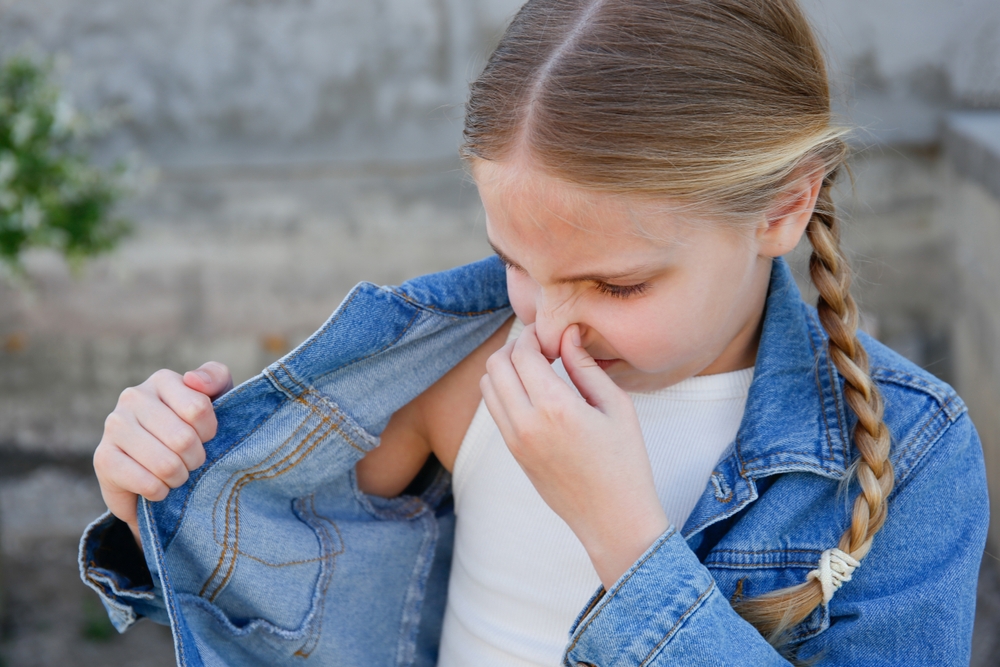Is Body Odour Normal Before Puberty?
When we think of body odour, we usually associate it with puberty and hormonal changes. However, some pre-pubescent girls develop body odour earlier than expected, leaving many parents wondering why. While occasional odour can be normal, persistent or strong body odour in young children may be a sign of underlying imbalances, including nutritional deficiencies, gut health issues, or even toxin accumulation. If there is a sudden change in body odour it might be worth investigating.
What Causes Body Odour?
Body odour is primarily caused by the interaction between sweat and bacteria on the skin. Sweat itself is odourless, but when bacteria break it down, it produces the familiar smell of body odour. While puberty-driven body odour is linked to increased sweat gland activity, pre-pubescent body odour can have other root causes, including:
1. Diet and Gut Health
The foods children eat play a significant role in body odour. Diets high in processed foods, refined sugar, and dairy can contribute to an imbalance in gut bacteria, leading to odour-producing metabolic byproducts.
- Sulfur-containing foods like eggs, garlic, and onions can intensify body odour in some children. You shouldn’t permanently remove these foods, rather find out why they are causing this issue.
- Excess sugar can promote the overgrowth of yeast and certain bacteria that contribute to odour.
- Food sensitivities, especially to dairy, can cause low-grade inflammation and an increased burden on detoxification pathways, leading to stronger odours.
2. Early Hormonal Changes
While puberty typically starts between ages 8-13, some children experience adrenarche, a phase of early adrenal hormone changes that can begin as early as age 6. This process activates the sweat glands, leading to body odour before full puberty develops.
3. Poor Detoxification and Heavy Metal Toxicity
The body naturally eliminates toxins through the liver, kidneys, and sweat glands. However, when these detoxification pathways are overloaded, toxins may be excreted through the skin, leading to a stronger or unusual odour.
- Heavy metal toxicity, particularly from aluminum, mercury, and cadmium, has been linked to increased oxidative stress and detoxification issues
- Children exposed to environmental toxins (plastics, pesticides, and pollution) may experience more difficulty eliminating these substances, leading to body odour.
- Hair Tissue Mineral Analysis (HTMA) is a useful test for detecting heavy metal burden and mineral imbalances contributing to body odour.
4. Overgrowth of Certain Bacteria or Yeast
Children with gut dysbiosis (an imbalance of gut bacteria) or Candida overgrowth may produce odour-related compounds like trimethylamine and volatile sulfur compounds. These compounds, excreted through the skin (or vagina) can lead to an unusual or stronger-than-normal body odour.
5. Synthetic Clothing and Personal Care Products
Many conventional deodorants contain aluminum, parabens, and synthetic fragrances, which can interfere with detox pathways. Synthetic fabrics like polyester can also trap sweat and bacteria, making odour worse. Choosing organic cotton clothing and natural deodorants can help minimize odour naturally.
6. Taking too much supplemental choline
Choline is naturally occuring in eggs, and a supplement often used to help children with anxiety, speech and rigidity. Taking too much of it can lead to body odour.
How to Address Body Odour Naturally
If your pre-pubescent daughter is experiencing body odour, here are some holistic steps to address the root cause:
1. Optimize Nutrition and Hydration
- Increase intake of whole foods, fresh fruits, and vegetables to support detoxification.
- Reduce processed foods, sugar, and dairy to minimize inflammation and bacterial imbalances.
- Ensure adequate zinc and magnesium, as deficiencies in these minerals can contribute to odour.
- Encourage drinking filtered water to help flush out toxins.
2. Support Detoxification
- Introduce leafy greens, cruciferous vegetables (broccoli, cauliflower), and fresh herbs like parsley and cilantro, which help with heavy metal detox.
- Consider Epsom salt baths (rich in magnesium) to support skin detoxification.
- Use natural deodorants with ingredients like baking soda, coconut oil, and essential oils.
3. Improve Gut Health
- Introduce probiotic-rich foods like yogurt, kefir, and fermented vegetables.
- Avoid unnecessary antibiotics, which can disrupt the gut microbiome.
- Address possible Candida overgrowth or bacterial imbalances with guidance from a naturopath.
- There is even research linking the putting probiotics in your armpits!
4. Choose Natural Fabrics & Personal Care Products
- Opt for breathable fabrics like cotton and bamboo.
- Avoid antiperspirants with aluminum, which can interfere with detox pathways.
- Use fragrance-free, natural body washes with antibacterial ingredients like tea tree oil.
5. Assess for Heavy Metal Toxicity
If body odour is persistent despite dietary and lifestyle changes, consider testing for heavy metal exposure using Hair Tissue Mineral Analysis (HTMA) or other functional testing. Supporting detox pathways through nutrients like selenium, zinc, and vitamin C can aid in removing heavy metals.
When to Seek Professional Support
If your child’s body odour is accompanied by other symptoms such as rapid weight changes, early breast development, fatigue, or persistent skin rashes, it may be a sign of hormonal imbalances or toxin accumulation. A naturopath can help by assessing mineral status, gut health, and toxin load while providing a customized plan to restore balance.
Final Thoughts
Body odour in pre-pubescent girls is often a sign that the body needs support. Instead of masking the odour with chemical-laden products, identifying and addressing the root cause—whether it’s diet, gut health, detoxification, or environmental factors—can lead to long-term improvements in health.
Make an appointment for some advice for your child.




